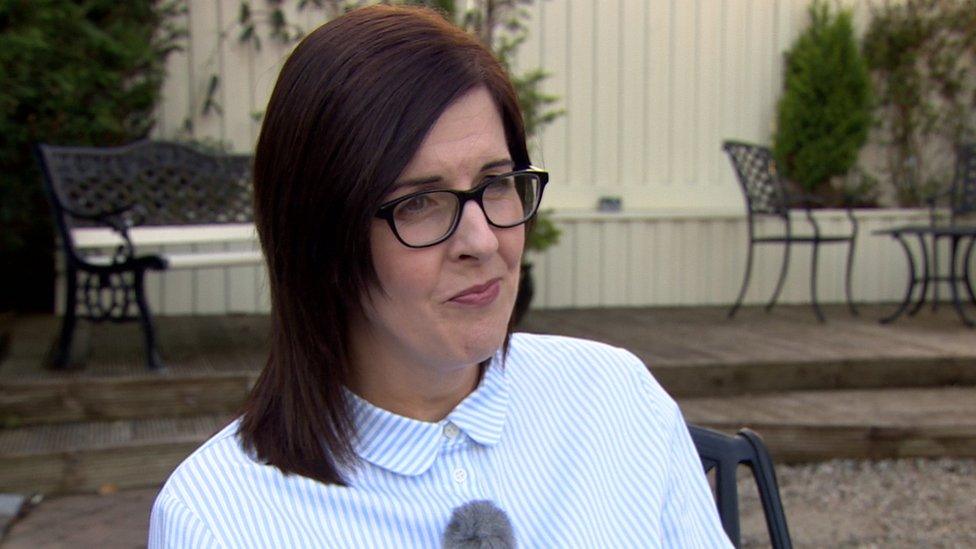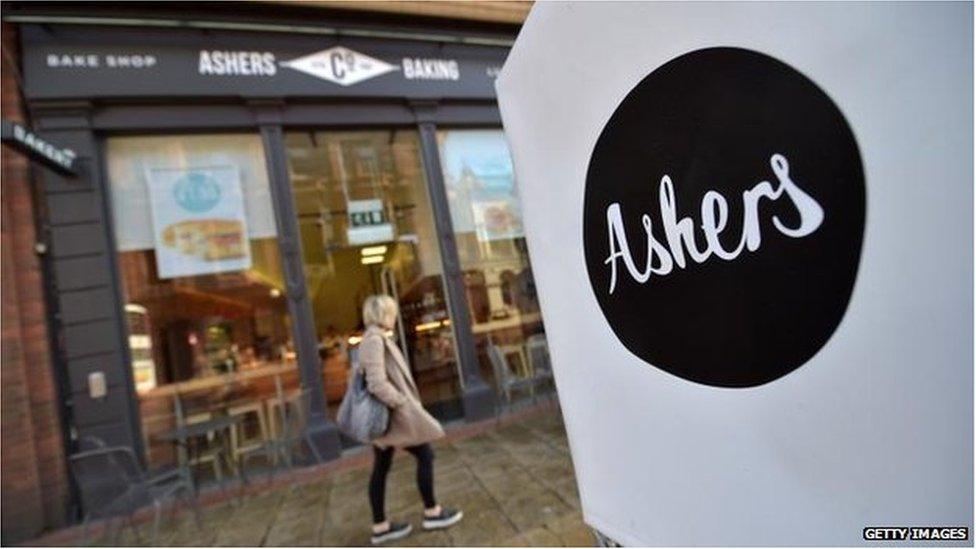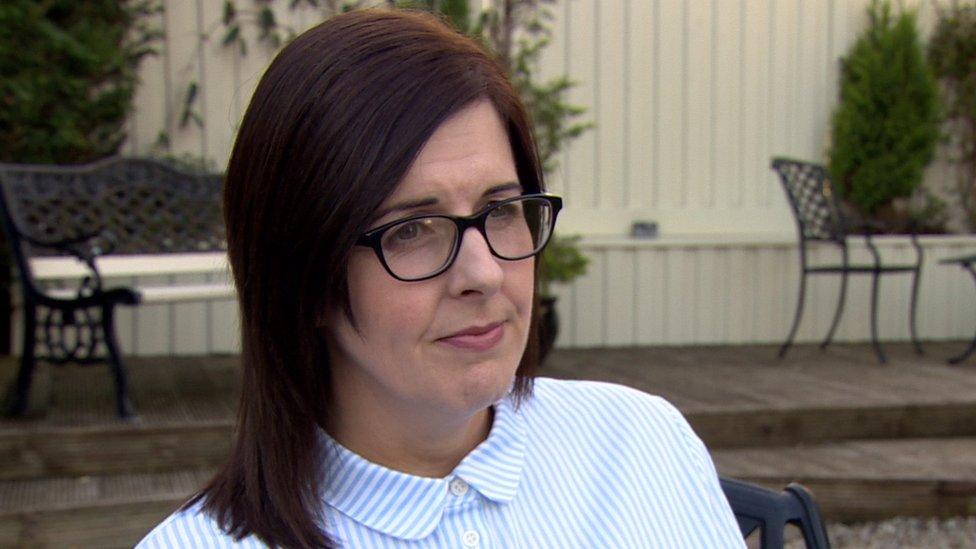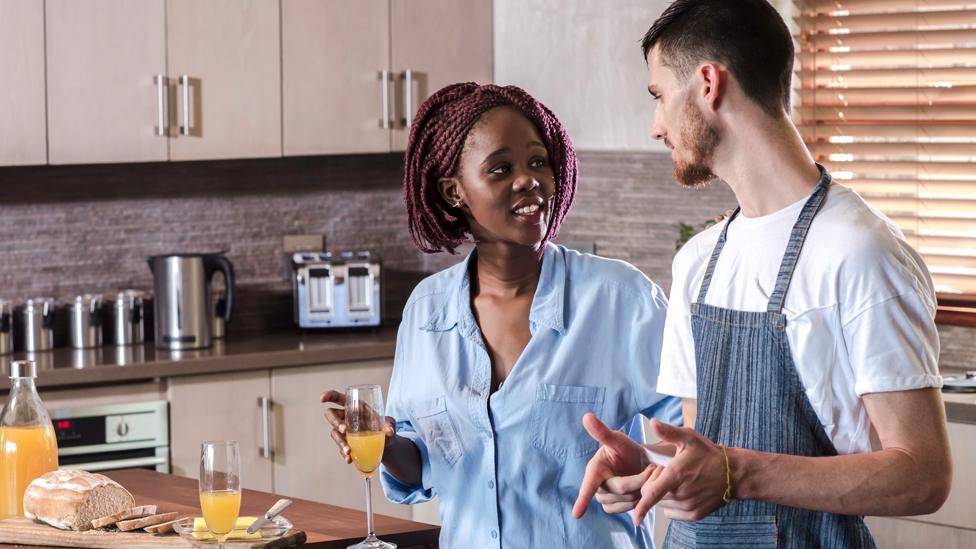Supreme Court sits in Northern Ireland for first time
- Published

Siobhan McLaughlin is challenging the rule that parents must have married to be entitled to widowed parent's allowance
A woman's fight for access to a widowed parent's allowance was the first case heard by the Supreme Court in a historic hearing in Belfast earlier.
The UK's highest court is sitting in Northern Ireland for the first time.
Siobhan McLaughlin, from Armoy, County Antrim, is challenging the rule that parents must have married to be entitled to the allowance.
Later, the court will start considering an appeal by Ashers Bakery in the so-called "gay cake" case.
The bakery's owners are challenging a ruling that their refusal to make a cake iced with the slogan "Support Gay Marriage" was discriminatory.
It is only the second time the Supreme Court, established in 2009, has sat away from its permanent home in London - the court held four days of hearings in Edinburgh last June.
At the start of Monday's session, the court's president, Lady Hale, noted the history being created by the hearings.
"I would just like to acknowledge the historic occasion of the Supreme Court sitting in Northern Ireland by saying how delighted I and my fellow justices are to be here," she said.
"This is only the second time the Supreme Court has sat outside London and we are very much looking forward to our time here this week."
The court's judgement on whether the owners of Ashers Bakery were guilty of unlawful discrimination is expected to be handed down later in the year or possibly in early 2019.
The court will also hand down judgement in a case concerning a couple from Londonderry who were jailed for £144,000 in benefits fraud during a 20-year period.
The Supreme Court hearings are the first court proceedings in Northern Ireland to be live streamed., external

Case one: 'Losing out on thousands of pounds'
Siobhan McLaughlin lived with her partner John Adams for 23 years and they had four children together, but the couple were never married.
Mr Adams died in 2014. It is estimated the family lost out on thousands of pounds because the couple were not married or in a civil partnership before his death.
After his death, the County Antrim woman challenged the rule that parents must have married to be entitled to a widowed parent's allowance.
Ms McLaughlin won the original case but it was overturned by the Court of Appeal.
The judges did not accept the argument that Ms McLaughlin had been discriminated against on the grounds of her marital status.
The Supreme Court's judgement on her case is not expected to be handed down until the end of 2018, or early 2019.

Case two: 'Gay cake' row
In May 2014, gay activist Gareth Lee placed an order for a cake to be made with the slogan: "Support gay marriage".
Two days later, the Christian-owned Ashers bakery cancelled the order saying it "would contradict their religious beliefs".

In 2014, gay rights activist Gareth Lee was refused a cake with the slogan: "Support Gay Marriage"
The Equality Commission wrote to the bakery requesting compensation, then took the company to court.
In March 2015, Mr Lee told the court that the bakers' refusal made him feel like "a lesser" person. The bakers argued their position was about the message, not the customer.
A judge ruled that the bakery was guilty of unlawful discrimination.
In 2016, the company appealed but lost. The judges said that, under law, the bakers were not allowed to provide a service only to people who agreed with their religious beliefs.

Case three: 'Stealing from neighbours'
In 2013, Michael Cecil Harkin, then aged 50, and Donna McCool, then aged 46, both of Circular Road in the city, were jailed for eight and four months respectively.
They admitted a combined total of 11 income support, jobseeker's allowance and housing benefits frauds.
McCool's total fraud amounted to £76,800 and Harkin's totalled £67,300.
A prosecution barrister told the court that both defendants made false declarations about their marital status in order to unlawfully claim the benefits.
Sentencing them, the judge said they were stealing from their neighbours and that every penny of government money was needed.
In 2014, a judge made confiscation orders for £38,814 against both of them - the cost of their half share in a jointly-owned house in Derry - and they have appealed against that.

- Published27 November 2017

- Published25 April 2018

- Published6 June 2013
- Published27 November 2017
